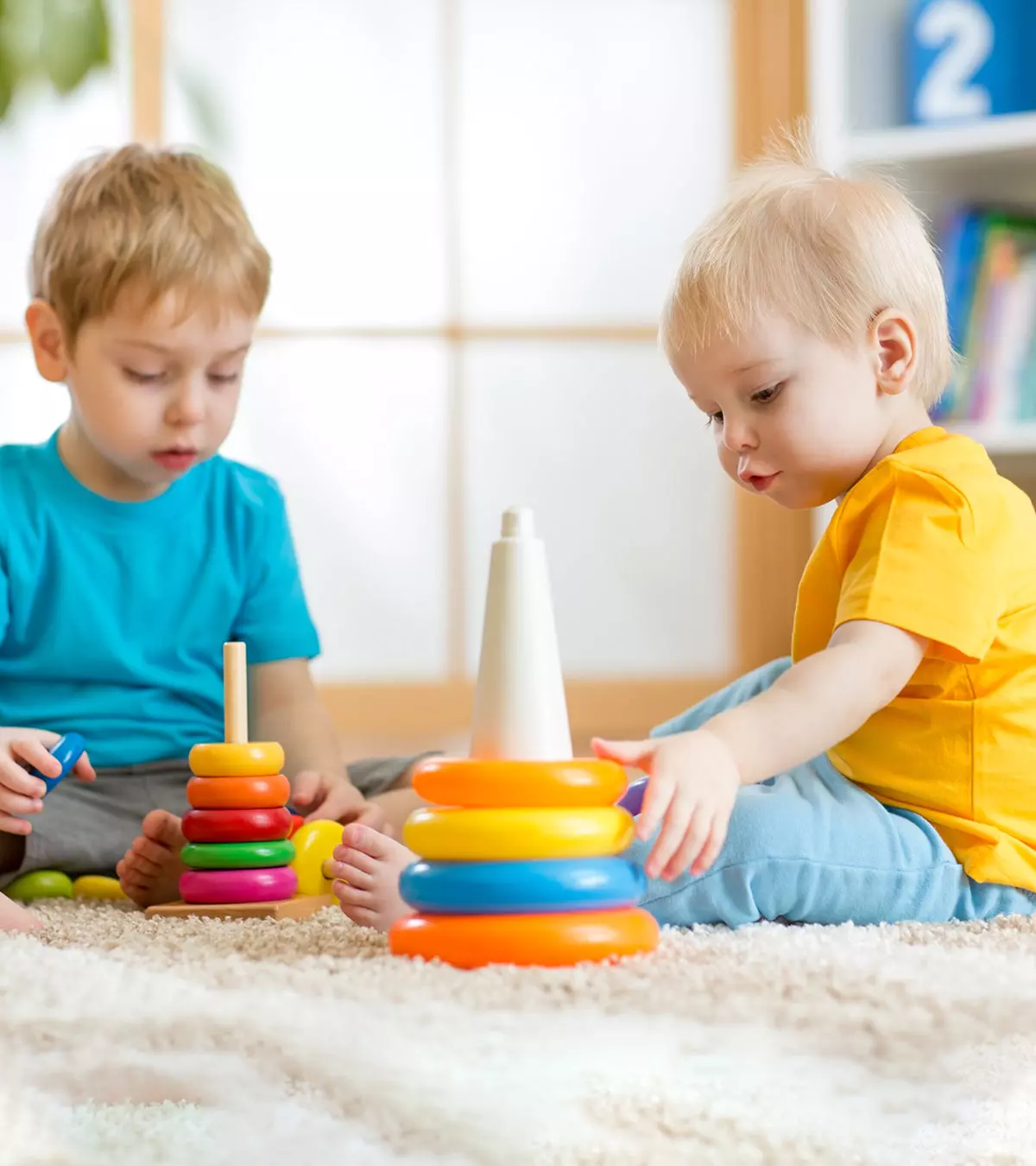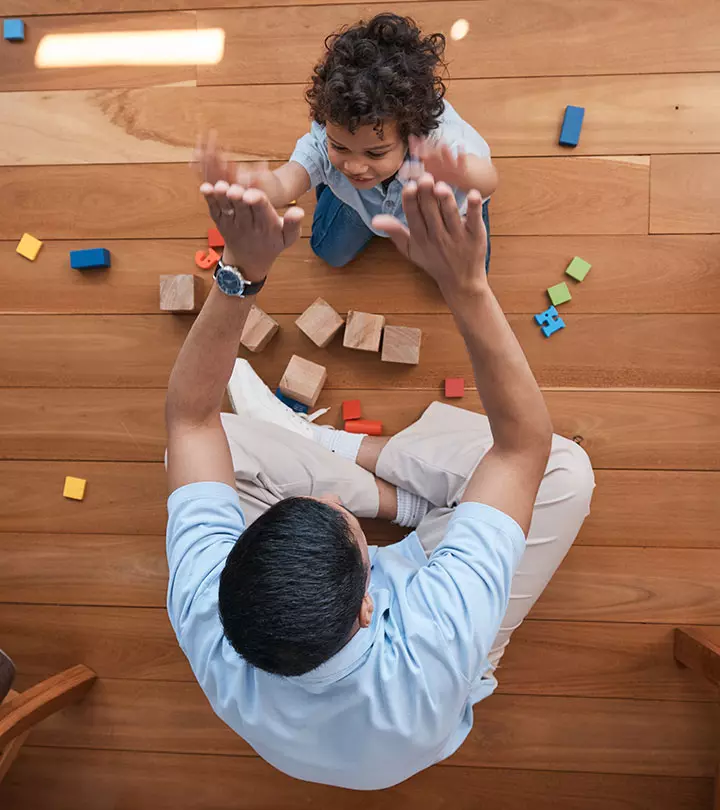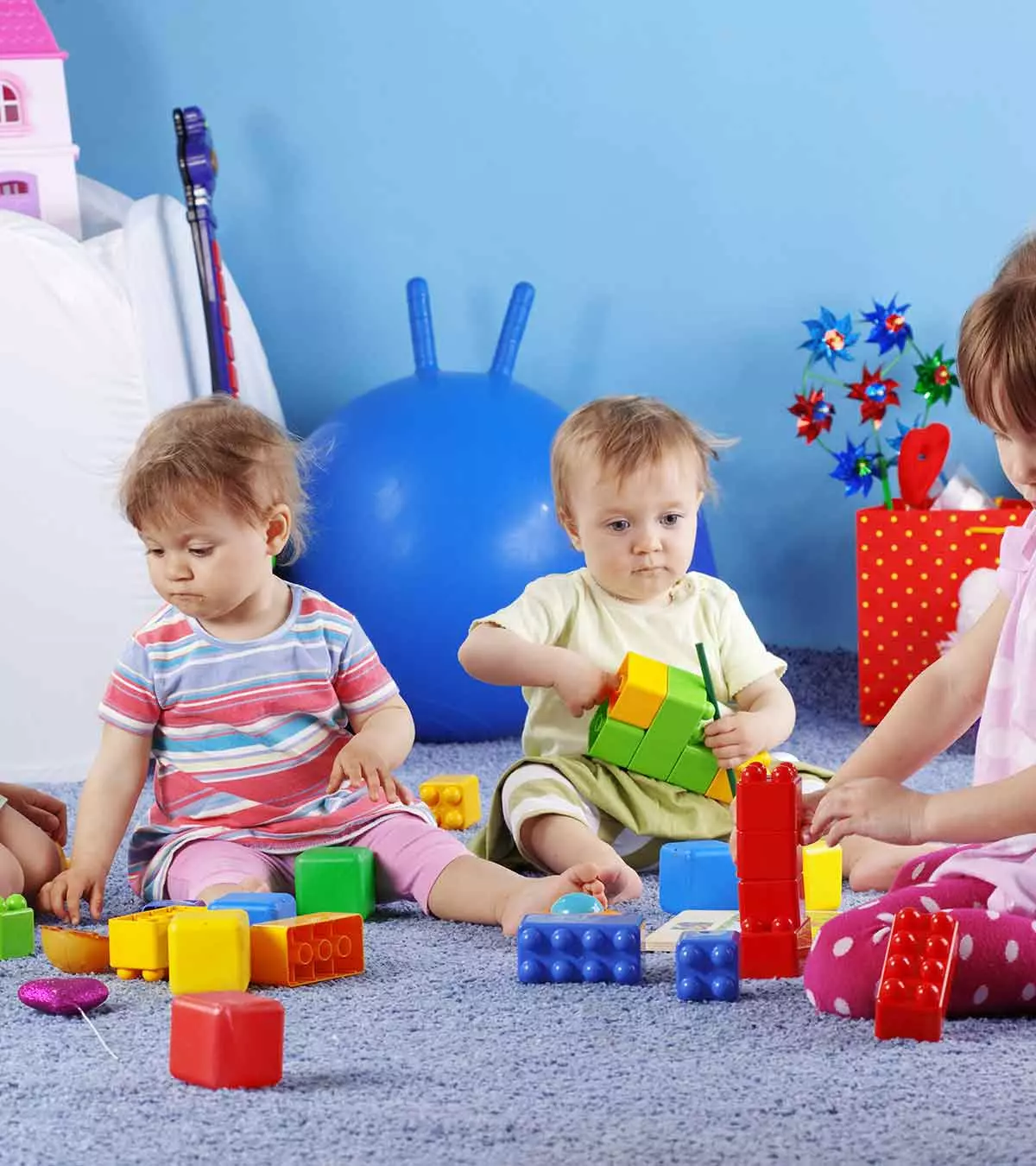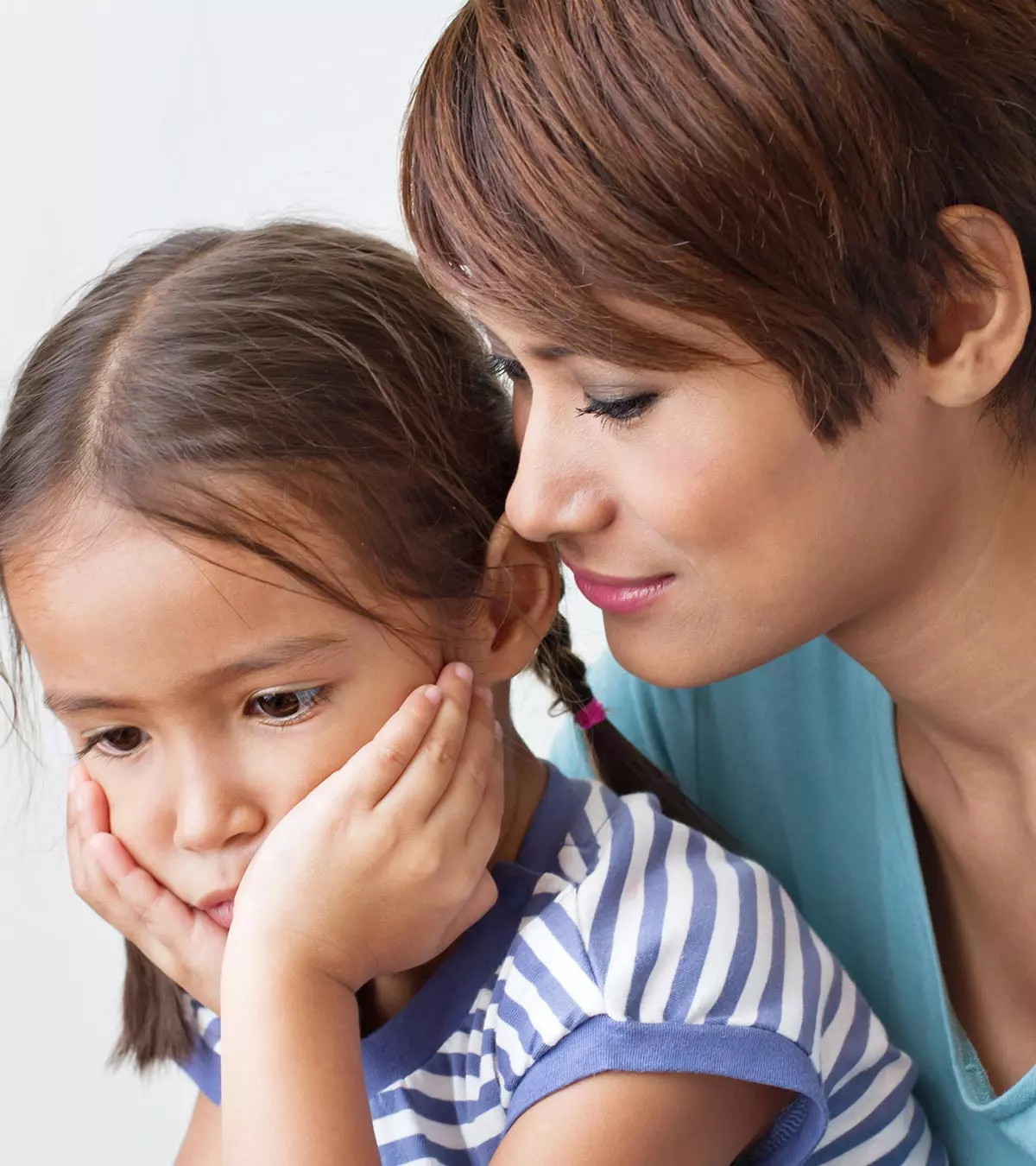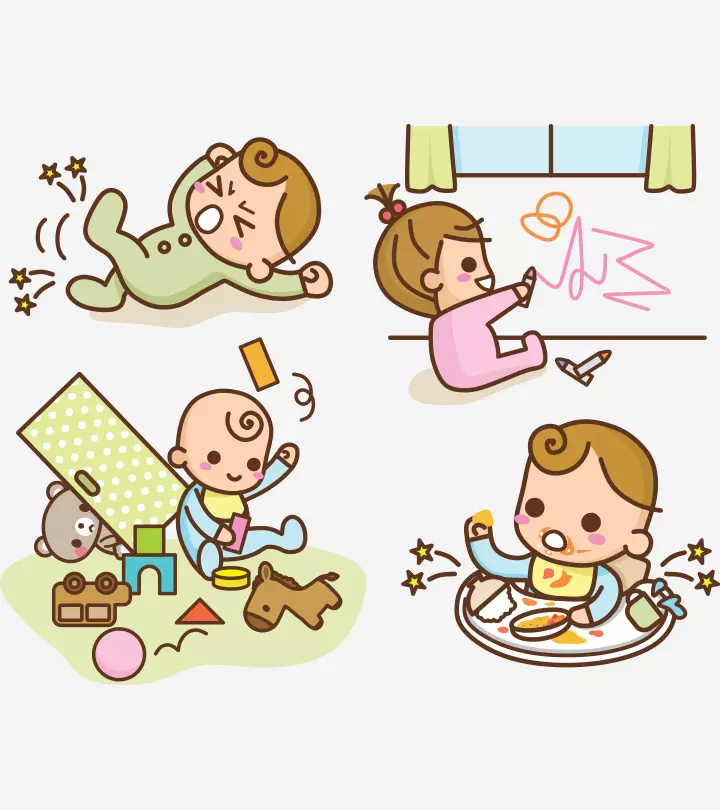
Image: Shutterstock
Every parent desires that their child grows up to be a responsible individual. However, you must first understand the importance of responsibility for kids and educate them about the significance of being accountable for their actions, whether good or bad.

This foundational skill can prepare them to face real-world challenges. It can also help develop self-discipline and social skills and foster independence—qualities essential for overall growth.
Simple tasks such as doing household chores, maintaining good hygiene, folding the laundry, and cleaning their room could help them learn important life lessons while making them feel responsible.
This article explains the importance of developing a sense of responsibility in kids. It also offers a few tips to help you teach your child how to become a responsible individual.
Key Pointers
- Developing a sense of responsibility in children helps them grow into accountable adults.
- Having a sense of responsibility helps them gain trust and become self-dependent.
- Maintaining a routine, being a role model, maintaining a no-blame policy, and other ways to teach responsibility to children are discussed below.
Need To Teach Responsibility To Children
Teaching responsibility to children can bring about several benefits to the lives of your little ones. Here are a few reasons for instilling responsibility in your child (1) (2).
1. Helps gain trust and respect
When you teach your children responsibility, you teach them to be accountable. This means your child would accept the consequences for their words, deeds, and actions. They will also learn values like honesty and discipline.
Being responsible helps your child gain self-respect and respect from others. When they take responsibility and complete tasks, it can give them a feeling of fulfillment and make them feel good about themselves. Also, when they complete tasks assigned to them, other people would notice them and respect them.
2. Teaches organization
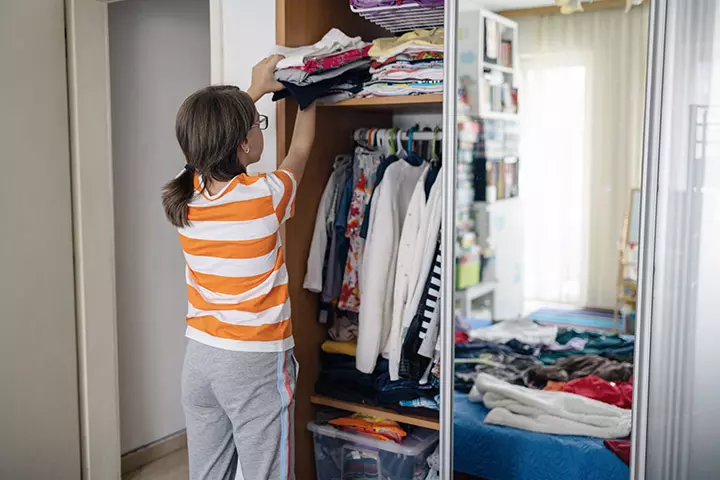
While trying to meet a commitment, your child will learn to prioritize tasks. They will also learn to manage time according to their obligations. They may even learn to prepare a list over time, thus learning organization, time-management, and decision-making skills.
 Point to consider
Point to consider3. Makes them self-independent
As being responsible is not restricted to just at home, your child would learn self-reliance and thus become a valuable member of society. Offering help to others and taking accountability for things can teach them to be self-independent and even inspire other children around them.
What Are The Duties And Responsibilities Of A Child?
Based on their age and development, here are a few duties and responsibilities you could let your child undertake (3) (4) (5). The age-wise obligations are not rigid but depend on how well your child can accept and adopt them in their routine. If they find a particular task difficult to do, be flexible enough to relax such duties.
Carla Burdt, a mother of two, narrates how she has divided household responsibilities among her children and how it helps to strengthen relationships. She says, “I’m a firm believer in age-appropriate chores. I don’t believe that children should be forced to do everything while the parents lounge around lazily, but it is important for them to contribute to household responsibilities. My kids usually spend maybe an hour a week doing chores — that’s less than 10 minutes a day! It’s not like I’m pulling them away from learning or playtime to slave away at their chores.
“We all share household responsibilities, and I rarely hear my kids complain about what they are required to do. My daughter has to clean one of the bathrooms and vacuum the stairs, my son has to dust upstairs and clean his room.” She further adds, “I want my children to have a great childhood and make great memories, but I also want them to know how to do the basic things for themselves (i).”
Two- and three-year-olds
- Learning to put the groceries and toys away
- Dressing with assistance
- Keeping the toys in their respective place after play
Four- and five-year-olds
- Helping put the dishes in the sink after a meal
- Arranging and cleaning their play area and bookshelves
- Making their bed
- Feeding the pets
Six- and seven-year-olds
- Putting used clothes in the laundry basket
- Cleaning the floor
- Wiping the table after meals
- Packing their school bags the night before
- Participating in other small chores around the house
- Completing homework
Eight- and nine-year-olds
- Helping with meal prep
- Packing meals for themselves
- Learning self-grooming
- Loading and unloading a dishwasher
- Stacking items appropriately
10- and 11-year-olds
- Changing the bed linings
- Cleaning the kitchen and bathroom
- Participating in small tasks such as raking the leaves or tending to the garden
- Gaining proficiency on the previously learned tasks
- Taking out the trash
12-year-olds and older
- Running errands
- Taking care of younger siblings and pets
- Learning to budget money
- Helping in deep-cleaning of the house
- Car-washing
How To Teach Responsibility To Children
Here are a few strategies you could use to teach responsibility to your child.
1. Teach them to clean up after themselves

The first step towards teaching responsibility to your child is to let them clean up after themselves after every activity. It is one of the most basic habits parents should teach their children. This involves arranging the things in a disorganized room after play or wiping the spills after meals. The best way to do this is to set an example. Let them observe you clean after yourself and make it a habit gradually. You can also assist them in cleaning to make the task seem less daunting.
2. Encourage them to take initiative
If you force them to do a task, they may think of it as more of a punishment rather than a responsibility. Try to make the chores fun, and find a way to make them do the tasks independently to give them a sense of fulfillment and help improve their self-confidence. Find what motivates your child to finish a task and encourage them that way. You could lend a helping hand only when absolutely necessary. It is alright if they do not do it perfectly, as the ultimate goal is to make them take initiative.
3. Teach them to help others
Teach them to help others with their tasks, no matter how small those tasks may be. You can let them help you with age-appropriate chores and gradually encourage them to help you with tasks outside of the house. For instance, they could look after the plants in the garden or feed a few strays. As they grow older, this need to help others will come naturally to them.
4. Help them prepare a list
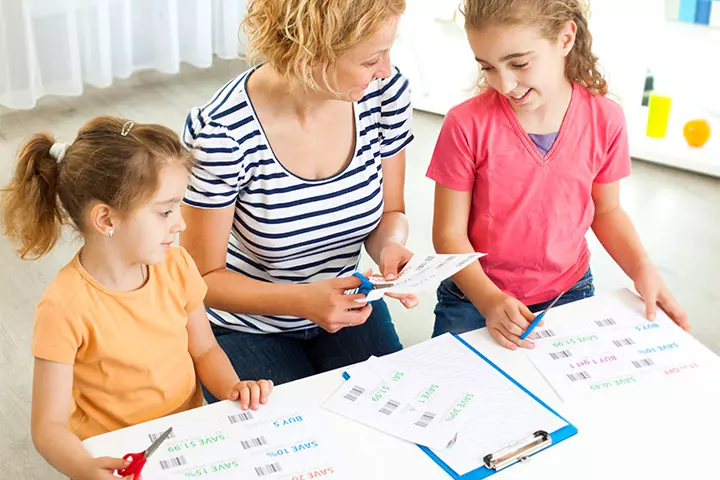
This could be a written or mental list. Preparing a list is one of the best ways to teach them self-discipline. Let them know the order of things to be followed after each task. For example, let them recollect what they must do after returning from school – whether it is putting the clothes in the laundry basket or watering the plants. You could also help them create a list of their daily chores or tasks. Ensure they complete them during the initial few days, until it becomes a habit for them. As they see their list getting shorter, their self-esteem will increase.
5. Make time a secondary factor
Most of the tasks you teach to young children would be new to them. Therefore, they may take more time to complete each task. So, when they are on those tasks, wait for them to complete them by themselves, even if they take more time. You could also try allocating them a certain task while you finish the larger task. For instance, you could let them clean a window while you finish cleaning the rest of the house.
6. Teach them to repair damages
Nobody is perfect, and this applies to your child too. Everyone is bound to make mistakes. However, what is important is how they learn to repair the damages done. It may be an argument they got into with someone or a rule they’ve broken in the house. Have a gentle talk and listen to their side of the story instead of ordering them to do the right thing straight away. Help them realize and accept their mistake and find a solution themselves, based on the situation. This teaches them self-control too.
7. Maintain a routine
Repetition helps a child remember things easily. Help them create different routines, such as bedtime routine, study routine, play routine, or morning routine (6). Make them repeat the steps under each routine every day. Once they learn what to do and when to do it, they can eventually do these tasks without your assistance.
 Point to consider
Point to consider8. Be a role model
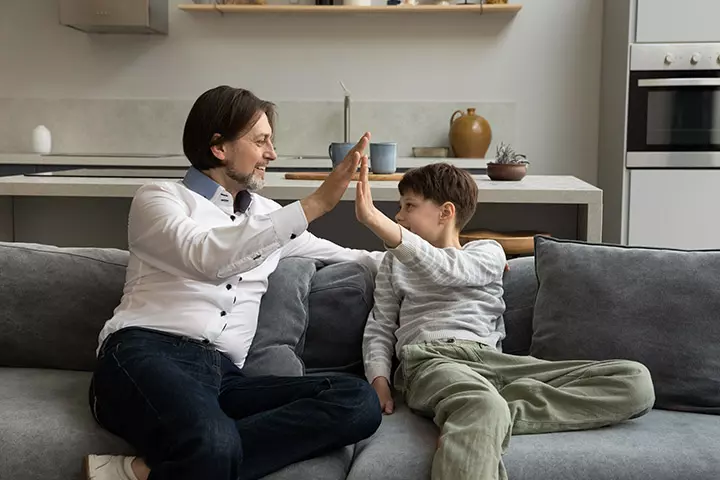
Children often learn by observing their elders. So make sure that everybody in your family is a responsible person around them. Teach good manners by being respectful towards others. Be reliable by keeping all the promises you’ve made to them so that they’ll learn to do the same. This also means that you should only make those promises that you can fulfill. Follow the rules of the house and the society, especially in front of them. When they see you being responsible, they will follow suit.
9. Maintain a no-blame policy
Sometimes, your children may not keep up with all of their tasks, or they may have a reason behind an irresponsible action. Try finding out the reason behind it rather than making them feel bad about it. Is it because they’ve forgotten about the task, or is it because they find the task daunting? Once you find the cause, use positive reinforcement to encourage them.
10. Teach them the consequences of their actions
Your child may not understand the need to be a responsible person. Explain it in a way they would understand. For instance, if they never get ready on time for school, you could explain to them that they may fall behind in class and may miss important information or that others may face inconvenience due to them.
11. Help them find solutions
Learning responsibilities could be a path full of challenges for a child. Thus, they may try to find escape routes. When your child faces difficulties, help them find solutions. For example, if they complain about too much homework, you can tell them to divide the work into smaller tasks. Stick by them and discuss the possible outcomes.
12. Let them pay for lost or damaged objects
If your child breaks something in the house, school, or neighborhood, or if they’ve lost something, make them pay for it with their pocket money. Alternatively, you can make them do some chores to compensate for it. The more they realize about the efforts that go into purchasing things, the less likely they will be irresponsible about objects.
 Do remember
Do remember13. Offer rewards for certain tasks
As children grow old, they may have to earn their pocket money by finding a job. After they’ve reached an appropriate age, start paying them for tasks that they wouldn’t normally do. You could pay them for tasks such as plowing the snow on the front yard or cleaning the house after a festival. This way, you would be preparing them for the responsibilities of the working world and also be teaching them perseverance.
14. Ask them to play a role during special occasions
When given a role during a special occasion, such as Christmas, Mother’s Day, or Father’s Day, they feel special, which makes them want to be more responsible. Put them in charge of choosing a present or guiding the guests towards the barbeque station. This responsibility may excite them and make them put their best foot forward. They will become dependable in the future.
15. Make them participate in extracurricular activities

It may be a sport or an art, but when your child participates in extracurricular or group activities, they have to get along with the others to have a good time. As every individual in a group has a role to play, they will be obliged to participate and play their role. When your child realizes that their efforts count and also determine the outcome of the group, they will try to be responsible.
16. Choose the right time
If your child constantly hears you speak about being responsible, they may lose interest even before performing a task. So, choose the time wisely. Try to avoid dropping tasks on them when they’re tired. Children tend to learn and understand better when they’re in a calm and playful mood (7). Use this opportunity to teach them instead.
17. Praise them
If your child has completed their task, do not forget to praise, or sometimes, reward them. Praise other qualities in them as well such as being caring, considerate, kind, and polite. You could get them the toy they’ve always been asking for or praise them in front of the family. Even if the task wasn’t completed perfectly the first few times, it is alright. They are still children and have years to master the task. As long as they take the initiative by themselves, offer suitable rewards or praise them for encouraging them further.
Types Of Responsibility
Giving responsibilities to children encourages independence and duty, preparing them for adulthood. Teaching various responsibilities helps in their overall development and social integration.
- Personal responsibilities: This includes personal hygiene, managing personal belongings, and taking care of their health.
- Household chores: Assigning age-appropriate household tasks like setting the table, cleaning, or helping with groceries.
- Academic responsibilities: Encouraging regular study habits and accountability for homework and projects.
- Emotional responsibilities: Teaching empathy, understanding others’ feelings, and appropriately expressing their own emotions.
- Community involvement: Involving children in community services or local events to develop a sense of social responsibility.
- Pet care: Teaching children to care for pets builds compassion and a sense of duty.
Frequently Asked Questions
1. What are the consequences of not teaching responsibility to children?
Not teaching responsibility to children might make them irresponsible and individuals with no self-control. It can also negatively impact their future as an adult, since these children may not know how to handle their relationships when they grow up, and may have poor decision-making skills.
2. What are some common mistakes parents make when it comes to teaching responsibility?
While teaching responsibility, many parents reserve punishments, and rude behaviors. Some parents also pressurize their children to act in certain ways which may pose negative consequences, such as lower self-esteem, inexpressive behaviors in children.
3. How can parents hold their children accountable for their actions without being too harsh?
If you wish your child to take responsibility for their actions and behaviors, instead of being harsh, tell them how their actions can hurt someone, and encourage positive enforcement. However, while doing so, your children should not feel abandoned.
4. What are some common challenges parents face when trying to teach responsibility?
When teaching your children to be responsible, challenges such as insistent behavior, outbursts, ineffective communication, frustration and tiredness may arise from children.
5. How can parents balance their responsibilities with those of their children?
Modeling good and responsible behavior can help you balance your own responsibilities while also setting up an example for your children. Positive behavior in children is a direct reflection of their parents’ behavior. Also, make sure you’re giving them age-appropriate tasks and not burdening them with your responsibilities, such as taking care of younger siblings, and cooking for everyone.
6. Do schools have a role in teaching children responsibility?
By incorporating practical and moral lessons on being responsible, such as encouraging volunteer work, cleaning the class, leading certain classroom activities and moral science studies can help children learn responsibility. Schools can also teach moral values to kids by talking about empathy and kindness.
Being responsible can help develop decision-making abilities and self-sufficiency in your child, which are important life lessons for kids. Give your children age-appropriate tasks, such as organizing games and toys for small children, running some errands, and assisting the elderly and parents with domestic chores. You should also teach your child to take charge, solve problems, and accept responsibility for their actions. Make sure you encourage the child when they do the right actions. Children learn from their elders. Therefore, make sure that everyone in your family, including yourself, behaves responsibly and sets a good example that your child can follow.
Infographic: How To Be A Role Model And Teach Your Child Responsibility?
Children learn several things by watching their elders and parents. So rather than telling them how to be responsible, show your child the meaning of responsibility by being a role model for them. Read this infographic that shares the simple things you can do in your day-to-day life to lead your child by example.
Some thing wrong with infographic shortcode. please verify shortcode syntax
Illustration: Best Ways To Teach Duties And Responsibilities To Kids

Image: Stable Diffusion/MomJunction Design Team
Being responsible is an important life skill for kids to learn. Delve into the world of responsibility for kids and inspire them to embrace responsibility through this video.
Personal Experience: Source
MomJunction articles include first-hand experiences to provide you with better insights through real-life narratives. Here are the sources of personal accounts referenced in this article.
i. My kids do chores, and no it isn’t abuse or slavery; MediumReferences
1. Teaching responsibilities to your children; The Centre for Parenting Education.
2. Importance Of Teaching Values And Ethics To Primary Students;Global Indian International School
3. What chores are right for my child;Pathways.org.
4. Chores and children;American Academy of Child and Adolescent Psychiatry.
5. Child development by age;The Centre for Parenting Education.
6. The power of repetition; Queensland Government
7. Create calm: it really matters;Children and Adults with Attention-Deficit/Hyperactivity Disorder (CHADD)
Community Experiences
Join the conversation and become a part of our nurturing community! Share your stories, experiences, and insights to connect with fellow parents.
Read full bio of Dr. Rana Chanchal
Read full bio of Kavita Kankani
Read full bio of Harshita Makvana
Read full bio of Apoorva K









